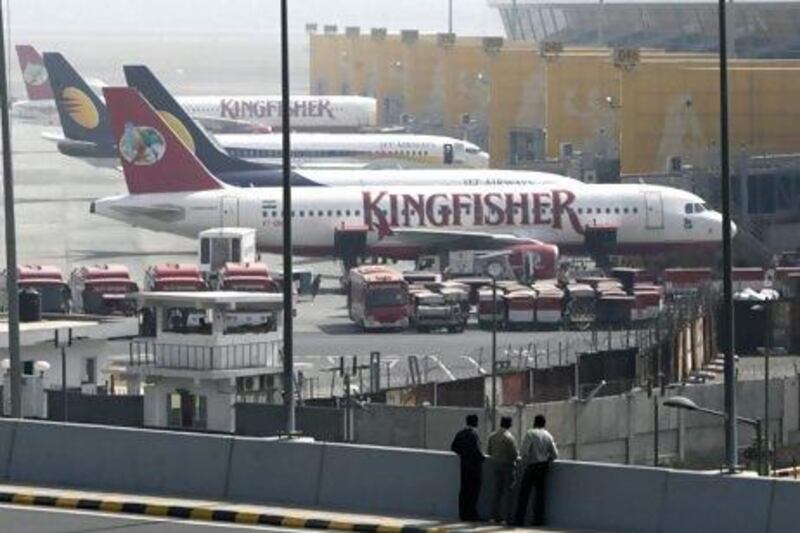Time is running out for Kingfisher Airlines to get off the ground again.
The carrier, which is owned by the flamboyant Indian billionaire Vijay Mallya and has never turned a profit since its launch in 2005, appears to be no closer to reviving its business almost four months after it grounded its fleet.
"It is basically on the verge of collapsing," says Sharan Lillaney, an aviation analyst at Angel Broking in Mumbai. "They're buying time."
Kingfisher halted operations at the beginning of October amid a dispute with workers over unpaid salaries. Later that month, the Directorate General of Civil Aviation (DGCA) suspended the airline's licence after it failed to present a plan outlining how it could safely and efficiently revive its operations. The licence expired at the end of last year.
Kingfisher maintains that it will fly again. This month, Mr Mallya told employees via email that he was aiming to restart operations by the summer with an injection of 6.5 billion rupees (Dh434.4 million) from UB Group "and associates".
When Kingfisher launched, the airline aimed to bring a new product to India's aviation market, offering five-star service. But its debt and operating costs quickly spiralled out of control as the carrier acquired Air Deccan and rapidly expanded its network. Kingfisher is estimated to have debts of up to US$2.5 billion (Dh9.18bn).
"The failure was, one, the acquisition early on and taking on debt," says Mr Lillaney. "Secondly, the recession hit in 2008 and 2009 and thirdly after the recession fuel prices rocketed and competition increased. Basically there were three reasons why they never actually made any profits. They were just trying to stay in the business long enough and turn profitable, but that never happened."
Sanjay Kaul is the president of the University of Petroleum and Energy Studies, which has a centre for aviation studies.
"I think it is, or was, a great airline," says Mr Kaul. "It did establish new benchmarks in terms of service, expectations. In a way it was ahead of its time.
"However, when it comes down to business, it was run more from the heart than from the head," he adds. "The financial management was an issue because you need very strong financial discipline for a start-up venture. That was missing. The focus was more on doing an almost difficult or impossible service delivery in those price points.
"All of this was guided by the owners' over-optimism that the discerning consumer would just pay anything for that level of service over and above the current benchmark and when the price wars started or the fuel price hit the roof, they realised that was not the case."
He explains that the flaws in the company's financial management meant that the airline could not survive once it hit choppy waters in the form of the global economic downturn, as corporates and tourists cut travel spending and fuel and airport charges soared. "They have simply hit themselves into a wall and time will tell whether they're able to get out of it," says Mr Kaul.
He believes there is hope, however.
"I still don't think it's a story which has ended. It's a gutsy group. It's not a group that fades away easily from any field.
"I believe that they have taken a bit on their reputation, but people still remember what they were capable of doing," he says. "So if they can somehow solve their funding problem and also have a stable [financial team] and finances, I think this airline can be revived."
Last month, Kingfisher said it was in talks with Etihad Airways and other potential investors. India's government in September opened up the aviation sector to allow foreign direct investment of up to 49 per cent from overseas airlines. But some analysts believe this move may have come too late for Kingfisher.
"Personally I think Kingfisher has had it," says Saj Ahmad, the chief analyst at StrategicAero Research. "The final nail was the loss of its operating licence. And without a meaningful recovery plan and money to support it, there is simply no way the DGCA will issue another licence to them." In a positive step, oil companies and some aircraft leasing companies granted Kingfisher no-objection certificates to resume operations. But it would also need to secure these from banks and airports.
The civil aviation minister, Ajit Singh, last week said that Kingfisher would need at least 10bn rupees to restart operations. It has also emerged that some leasing companies are finding it difficult to recover aircraft from Kingfisher as government agencies try to use these as collateral against debt.
ICCI Securities stopped rating Kingfisher's stock last March because of all the uncertainty.
"We believe a significant fund infusion by the KFA promoter themselves remain very crucial for running the business, going forward," says Rashesh Shah at ICCI. "Hence, due to the deferment on the fund-raising front and given the uncertainty on the company's future outlook, we continue to leave the stock as unrated."
Mr Lillaney believes that a stake sale is unlikely. "That's all rumours and it will never happen. Why would you buy a stake in this company?
"Our view is that about $300m to $400m has to be infused in the entity to restart operations," he adds. "It can only happen if the promoter invests his own personal capital in the company. There is hope if he's ready to put the money in from his own pocket, but it's a very unlikely situation.





